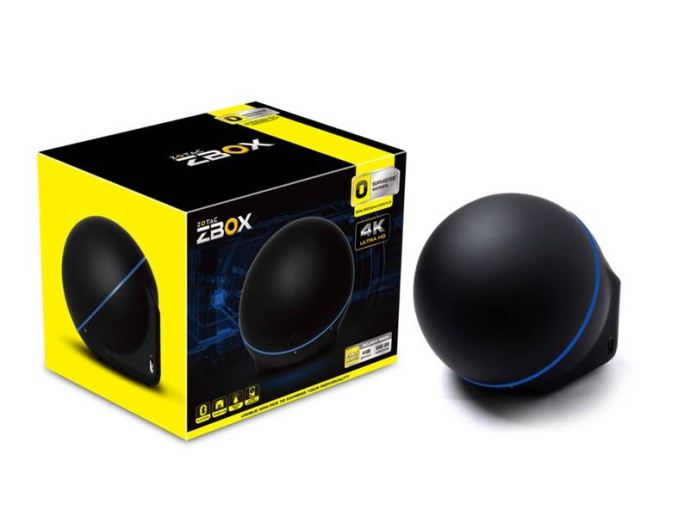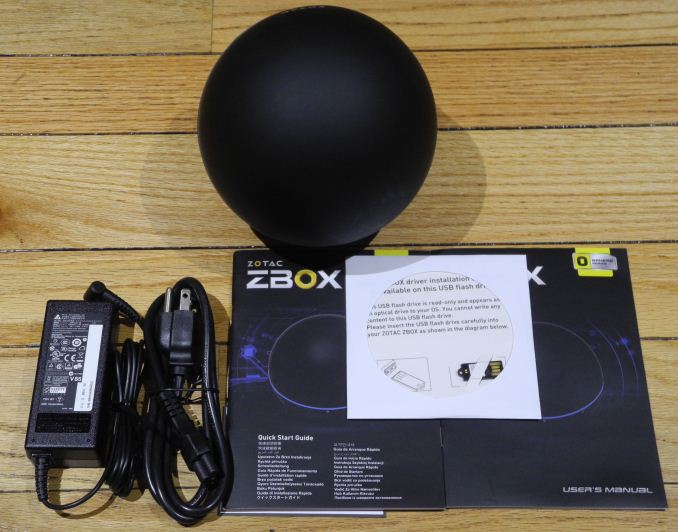ZBOX Sphere OI520 Plus: Zotac's Take on the NUC
by Ganesh T S on August 1, 2014 8:50 AM EST
Introduction and Setup Impressions
The Intel NUC has created a very successful niche for itself in the SFF PC market. It provides us with insights into where the traditional casual / home use desktop market might end up. While vendors such as Logic Supply have taken the Intel NUC motherboard as the base and built effective designs on top of it, companies like Gigabyte have their own take with the BRIX lineup (which has more options compared to the traditional NUC line, including AM-based ones and NVIDIA GPU-equipped units). In this situation, we have Zotac come out with the ZBOX Sphere lineup. A motherboard tracing its origins (like the Intel-based BRIX units) to the Intel NUC, it differentiates itself mainly in its aesthetics. Even though the features like support for a mSATA SSD in addition to the standard 2.5" drive immediately remind users of the NUC, Zotac is itself no stranger to UCFF motherboards and systems. We have seen the Zotac nano xs units predate the NUC, making Zotac a pionner in this domain..Update: Zotac confirmed to us that the motherboard inside the OI520 is based off their existing Haswell-based nano units.
Zotac provides both barebones and Plus models, as is customary with all their pre-built PCs. The Plus model comes with a disk drive as well as some DRAM bundled. Our review configuration was the Plus model with the following configuration.
| Zotac ZBOX Sphere OI520 Plus Specifications | |
| Processor |
Intel Haswell Core i5-4200U (2C/4T x 1.60 GHz (2.60 GHz Turbo), 22nm, 3MB L2, 15W) |
| Memory | 1 x 4GB DDR3L-1600 |
| Graphics |
Intel HD Graphics 4400 200 MHz / 1 GHz (Turbo) |
| Disk Drive(s) | 500 GB Seagate Spinpoint 2.5" HDD + Spare mSATA Slot |
| Networking | 1 x Gigabit Ethernet, 1x1 802.11ac mPCIe |
| Audio | Capable of 5.1/7.1 digital output with HD audio bitstreaming (mini-HDMI / mini-DP 1.2) |
| Operating System |
Retail unit is barebones, but we installed Windows 8.1 x64 |
| Pricing (As configured) | $470 on Amazon |
| Full Specifications | Zotac ZBOX Sphere OI520 Plus Specifications |
The Zotac PCs don't come with any pre-installed OS, but we do have a read-only USB key with Windows drivers. In addition to the main unit, the other components of the package include a 65 W (19V @ 3.42A) adapter, a US power cord, a Quick Start guide and an user manual. We installed Windows 8.1 Professional x64 for our evaluation purposes.
There is no doubt that the ZBOX Sphere series owes its design aesthetics to the ill-fated Nexus Q. The rear of the unit has been modified a bit to accommodate the motherboard at an angle. Unlike some of the other mini-PCs that we have evaluated, this one ticks the right box in having a USB port on the side. The gallery below takes us around the hardware.
Prior to moving on with the rest of the review, we have a small table that gives an overview of the various systems that we are comparing the ZBOX OI520 against. Note that they may not belong to the same market segment. The relevant configuration details of the machines are provided so that readers have an understanding of why some benchmark numbers are skewed for or against the OI520 when we come to those sections.
| Comparative PC Configurations | ||
| Aspect | Zotac ZBOX OI520 Plus | |
| CPU | Intel Core i5-4200U | Intel Core i7-4770R |
| GPU | Intel HD Graphics 4400 | Intel Iris Pro Graphics 5200 |
| RAM |
Crucial CT51264BF160B.C16F 11-11-11-28 @ 1600 MHz 1x4 GB |
Corsair Vengeance CMSX8GX3M2B1866C10 10-10-10-32 @ 1866 MHz 2x4 GB |
| Storage |
Samsung/Seagate Spinpoint M8 ST500LM012 (500 GB, 2.5in SATA, 5400 RPM) |
Samsung SSD 840 EVO (120 GB, 2.5in SATA 6Gb/s, 19nm, TLC) |
| Wi-Fi |
Intel Dual Band Wireless-AC 3160 (1x1 802.11ac - 433 Mbps) |
Realtek 8821AE Wireless LAN 802.11ac (1x1 802.11ac - 433 Mbps) |
| Price (in USD, when built) | $499 | $829 |

















40 Comments
View All Comments
Sushisamurai - Friday, August 1, 2014 - link
It would almost seem like a 65W Kaveri would have been a better fit in this system... Especially considering local file playbackSushisamurai - Friday, August 1, 2014 - link
Oops, didn't notice this was a 15W watt part... Kaveri doesn't really fit then... Or does it ^_~BMNify - Friday, August 1, 2014 - link
no amd soc meets these soc as AVX2 and Intel® Quick Sync Video are pretty much a base requirement in 2014/15 for high quality video playback and real time video capture/streaming.BMNify - Friday, August 1, 2014 - link
OC saying that , even this dual core/quad thread intel soc doesn't really cut it for me, i cant even remember the last dual core anything i bought, even with intel in 2014/15 even if the OEM's are buying loads of intel soc for the next mobile/static blitz this holiday season , im not interested in buying as an end consumer unless its got quad core, and the said AVX2+ and Quick Sync...Assimilator87 - Friday, August 1, 2014 - link
<blockquote>no amd soc meets these soc as AVX2 and Intel® Quick Sync Video are pretty much a base requirement in 2014/15 for high quality video playback and real time video capture/streaming.</blockquote>BMNify, I'm not arguing against your love for AVX2 and Quick Sync. On the other hand, you've overlooked some details. Haswell is not an SoC. That honor belongs to the Saltwell based chips. Also, both AMD and nVidia have equivalents to Quick Sync, being VCE and NVENC respectively.
xdrol - Sunday, August 3, 2014 - link
Mobile Haswell _is_ an SoC.But AVX2 as base requirement? lol.. there are practically no programs for AVX2 because Intel decided to leave it out 70+% of all sold devices (Celerons, Pentiums). And QuickSync as "high quiality"? Have you even seen what blurry shit it makes?
emn13 - Sunday, August 3, 2014 - link
That's just nonsense. You certainly don't need quicksync for even high-end video playback - a single CPU tends to be enough (and you've got more than one, right?). I suspect AMD has a "iGPU" accelerated playback mode too. Though again, you don't need it (and the quality of quicksync is inferior to that of software decoders/encoders).AVX2 is neat, but similar truly not a requirement.
I recently got smoothvideo to run... smoothly on an ancient Q6600 with an ancient 9600GT card. I would certainly recommend more, but note: you really don't need quicksync.
Flunk - Friday, August 1, 2014 - link
Gigabyte build a Brix based on AMD's last-gen Richland core. Now that a 45watt Kaveri chip is available they may decide to build one with that.For perspective the i7-4770R in the Brix Pro, which is both larger and runs hot is a 65watt chip so I can't see zotac fitting it in here.
nathanddrews - Friday, August 1, 2014 - link
I was going to say "wait for Carrizo", but that will likely be a 28nm part (at this rate), so I don't think they'll get their power/heat issues resolved. I like these little systems, but they are all just too weak in GPU power to justify moving away from my current setups.Sushisamurai - Friday, August 1, 2014 - link
Yeah, little systems attract me too. But I agree with subpar GPU performance. I still remember my netbook struggling to run a 1080p mkv file... *sighs*